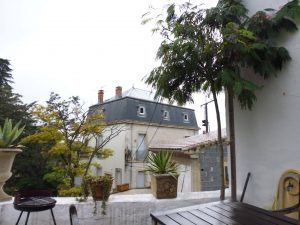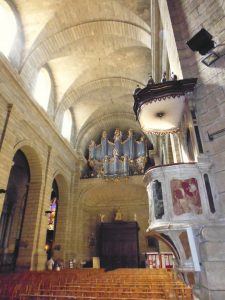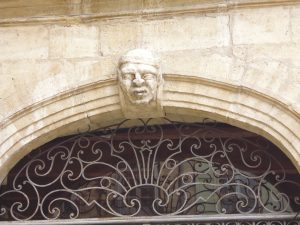Agents and choices; vineyards and medieval towns
It is absolutely evident that wine is the local industry, There are vines everywhere in this region. One of my agents (V, who originally came from Lebanon) chose, she said, to live just a little further inland, near the manmade Lac Salagou, to get away from all the vineyards. ‘Les vignes! …les vignes!’ She wailed – what a comic! – as she careered across the countryside to take me to view a possibly too-historic house. It was near an area with hills and an ancient ruined castle right on top of one of the escarpments. Or was it just more escarpment I was squinting at? Yes, they’re everywhere – both escarpments and ancient castles.
Lac Salagou, incidentally, was created in 1968 to regulate the Salagou river (since flooding is something of a feature of the Hérault department) and benefit agriculture. It is now the centre of much camping and water sport. Another feature is the village of Celles, which was to be condemned to the deeps when the lake was formed … but the water never quite reached it. It stands empty now, and ghostly, on the edges of the water and all that red terrain, though apparently it is still registered as a village. At least one other village did drown, though, and one lone church steeple made an eerie reappearance during a recent year of extreme drought. I’m told.
Countryside can be almost rugged sometimes, and vaguely reminiscent of parts of Australia with the very red earth around Salagou and Clermont L’Hérault, the scruffiness of many of the trees and the dusty green of the olives, and the harshness of the limestone that never seems to be far from the surface. It’s dawning on me that all my internet surfing drew me here because it is almost familiar.
Castles, castles. If you tire of the more stolidly genuine medieval variety, there are always what Y, another agent, calls ‘follies’. These are copies, from the 19th century, and tend to be a little Disneyesque. Much pointer than the squared-off originals that were actually meant to repel invaders. And also, I suspect, built or renovated to echo Northern styles and practices, since in the south around here there is no slate, which means that castles were originally built with earthen tiling on the roofs. So while not all pointy, slatedcastles are not necessarily ‘follies’, neither are they altogether in the
original local style. I suspect most of the ‘folly’ labels truly refer to the houses built by vignerons who suddenly found themselves wealthy in the 19th century, and built themselves very imposing and aristocratic-looking mansions that would loom satisfactorily over the peasantry.
Architecture, overall, is a matter of some importance hereabouts, and probably in the whole of France. There are ancient castles and ancient churches everywhere, and ancient, narrow and steep streets winding through canyons of timeworn houses. I think, in fact, that what makes them all so beautiful is the combination of practicality with aesthetics. And, of course, the other thing about most of the local architecture is that it was built from local materials and so feels as though it has grown from the landscape itself. Though, I have to say, some of the follies are actually quite lovely too.
One of my favoured potential homes looks onto a nineteenth century mansion/folly (right).
Speaking of agents – as I was some time ago – mine have been interesting. They each come in some way from somewhere else. V, as I said, comes from Lebanon. This used to be a French holding, so Lebanese kids were all able to come to France for tertiary study. Eighteen years ago, V first came here, but then war came to devastate poor Lebanon, and her whole family trooped over to escape. So she stayed on. Before coming to the Hérault départment of Languedoc, she used to live and work on the Côte D’Azur.
C – who showed me the 16th century house with neighbouring castle – comes from a family that was ethnically Spanish. His grandfather lived in Algeria and came here when that all blew up so spectacularly and bloodily. This was possible, or indeed was automatic, because everyone was considered French under the régime there. C’s family’s situation was therefore very similar to V’s.
Y (he of the house with manorial neighbour) is a different case. He simply comes from Breton. He is, however, and by contrast with real estate agents we are more used to in Australia, interested in everything, including politics and the environment, and happy to talk about them. His wife works on restoring old buildings. Y and I have had long chats about Australian politics (both he and C are amazed that Australians could have elected Abbott and his cronies) while hurtling from village to village. Y’s wife, not surprisingly given how she earns her living, has a great interest in history, and Y says she is descended from Charles V. I told him I am supposed to be descended from Henri IV (Henri de Navarre), but that I expect most of France is too, as he was quite ‘actif.’ This was a little joke I made in French. I hope you’re impressed.
All of the agents can speak English, though V speaks it the least. They relax happily into French, however, as soon as you say ‘bonjour.’ We end up speaking a bit of both. They also, incidentally, all wear jeans and t-shirts, and drive rackety little cars, which is vastly different from the black suits and deluxe sports models more common among agents in inner-city Melbourne.
Bonjour is a useful word in general, along with bonne journée and bonne soirée, all of which are used a couple of dozen times a day or so. It’s a formal and rather lovely thing in this rural area, where you greet just about everyone you come across.
–o0o–
Interspersed between my excursions around the countryside have been my adventures with my SIM. When I first started the hunt for a French one, I took the bus to Pézenas, bought a phone and walked across the (admittedly not enormous) town to the two shops rumoured to stock SIMs, but neither had any to sell that day. Sacre Bleu! To be fair, the lack of any SIMs in the whole of the bustling tourist-town of Pézenas is unusual, I understand. But still.
A day later I found one in Béziers (a bus ride after the one from Pézenas, and then another from the central bus terminal to the station). This triumph deflated immediately upon my discovery that there was no timely transport to my next appointment with an agent. There was one train to Magalas, but that had been and gone some time before. And there was no-one to tell me about buses. I had to take yet another expensive taxi-ride, though this time I did at least ask how much it would be … ‘way too much, but at least not worth a ticket to the Seychelles. It must be said,
however, that this sad tale did wring my agents’ hearts with pity, and after that they have come to pick me up and drop me off at Les Clairettes.
Anyway, getting back to the SIM card. Pretty soon, and after maybe three calls, the phone stopped allowing me to ring out. I’m not sure whether this is because calls are really expensive or I really needed to buy a better deal, or whether it’s related to the constant texts apparently insisting I register within eight days or be cut off forever. I think it’s in case I’m a te***rist. I had to get one of my agents to tell me what was going on, which was that I had to fill in the form in the original SIM package and send it off in the envelope provided. Which last I have, of course, jettisoned along the way. Luckily, I still have the form.
And so, back to Pézenas. First on a Monday, which was a mistake as everyone in France takes the day off on Monday. Well, perhaps they don’t in Paris.
Then on Wednesday, where the flustered girl behind the Orange counter helped me fill in the form, but had to decipher the small print for me for the address to send it to. She couldn’t do the sending for me. Dang again. Also, she couldn’t recharge the phone calls either. So, to the supermarket next-door to buy recharge … which I spent the next 24 hours trying to work out how to apply. Lucky I hadn’t thrown away the original receipt from Béziers from when I bought the original charge and SIM, hey! And thence across town again to the post office so I can send the form so the police don’t raid the caravan park and take me away as a subversive. Or should that be ‘sub***sive.’
This morning I worked out how to recharge the phone. The sun is out, the birds are singing, etc.
–o0o–
I have made three jokes in French so far. The one about Henri de Navarre; a comment that a tiny terrier was barking at pigeons almost bigger than him; and when I said that getting through the door with all my breakfast dishes was ‘delicat’, as one of the Clairettes proprietors rushed to help. Everyone is polite enough to laugh. 
Inside the Eglise de St Jean, with its organ loft and the marble pulpit. Marble is found locally, so many churches are quite lavish with it.
I am willing to bet that this face (below) was originally a portrait – maybe even a self-portrait of the artisan who carved it hundreds of years ago in Pézenas.
When not hunting down SIM cards etc in Pézenas, I have spent a little time in exploring, though I am not intent on this as I figure I will have plenty of time to do this in the future. While tourists outnumber locals by about five to one (it’s summer, after all), it truly is a fascinating place. There are the Eglise de St Jean with its soaring arches and organ loft; great, stone staircases; ancient medieval watch towers on the corners of buildings and so on and on. There will be more time, later, devoted to looking at old stuff rather than search for SIM cards, shoes, bathers (I left mine behind) and so on.
The weather has been lovely – in the 30s, most days. That’s why I yearn for bathers. It’s down to me, evidently, since before I turned up they were having a lousy summer.
It seems like a good idea to make use of this weather, this space and this, my first visit to Europe. I’ve seen my shortlisted houses and I’m pretty certain which one it’ll be. My other favourites either turned out to be too remote and too ramshackle, or potentially grand only after the spending of a small fortune, or – sadly, this was the one with the actual castle next-door – liable to render you unconscious due to beams in the wrong place above the stairs. I am fond of the 19th century house that looks onto the vigneron’s folly. That’s the one, and I’ll tell you all about it another time …
–o0o–
In the meantime, I am off to spend a couple of days just outside of Nîmes with my friend Alan and his family, before taking a hotel room for a week in Agde while preliminary house business is finalised.
Farewell it is, then, to Les Camping Clairettes, to the donkey, goat and horse. I have discovered via halting conversation with one of my hosts that there is a bus that takes you all the way from Adissan to Montpellier for a euro and a half. You have to book, though, so I have. Thence, there will be a train to Nîmes. And so I trundle my rackety wheeled case up the road to my 14th century bus-stop and while away the time with an old fellow who shakes his head a lot about the grape harvest to come, it’s been such a bad summer. The bus comes, and apparently I will be almost entirely alone all the way to Montpellier. No wonder you have to book.
